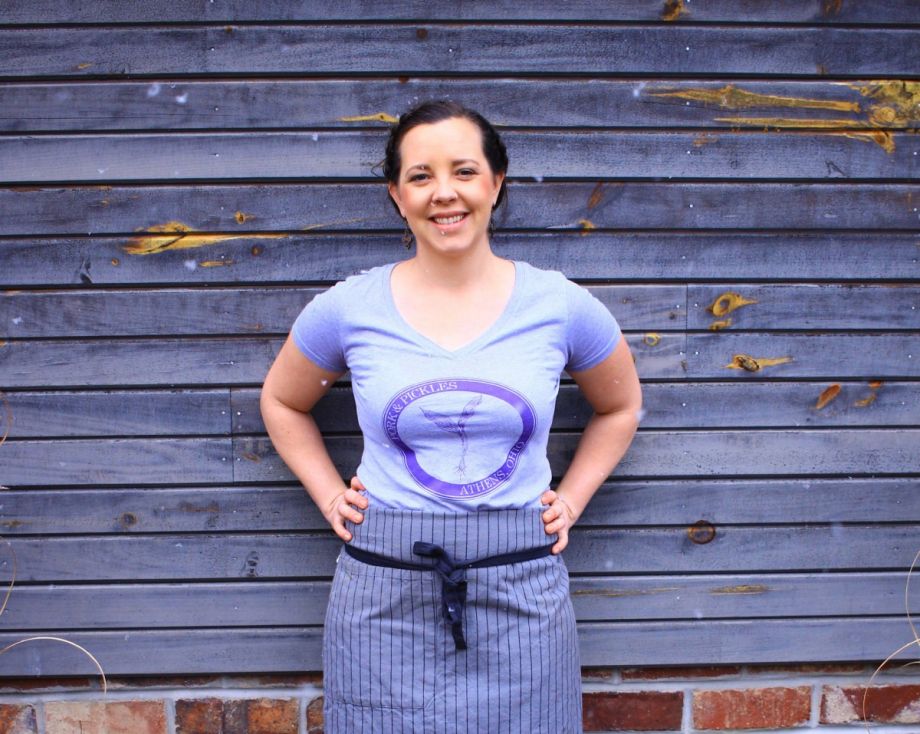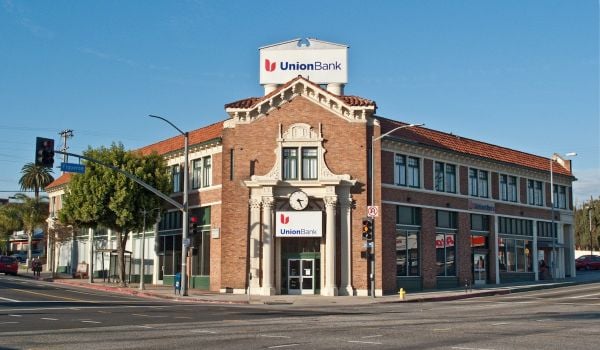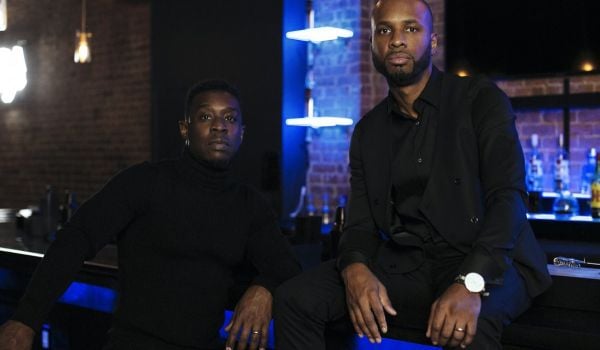Becky Clark is one of just a few hundred female butchers in the United States. “My dad hunts, so I grew up butchering deer with him,” she says. Clark grew up in and around Athens, Ohio, in Central Appalachia. But, like many young people, she left Athens after graduating from college to make her fortune elsewhere.
“I moved to Portland, Oregon, at the height of the recession. And I was not getting a job with my bachelor’s degree,” Clarks says. So, she signed up for culinary school, where she met Camas Davis, a female butcher. That meeting and Davis’s passion, drew Clark into butchery.
“All the places I’ve worked [since], I’ve either led a meat program or worked at a whole-animal restaurant,” Clark explains. “On Tuesday we would butcher a whole pig and then use that whole animal on our menu throughout the whole week.” But when a divorce forced her to re-evaluate her life, Clark decided it was time to return home and to start her own business.
“I didn’t know that I wanted to have a business,” Clark says. “It felt like my only option.”
Athens is a small city in a region known for its poverty. Athens has an estimated population of 40,000 during the day when some 20,000 Ohio University students are on campus, but that number shrinks when the commuters leave. This landscape contributed to Clark´s sense that when she decided to return home, she would have to create her own employment.
After working in James-Beard-award-winning restaurants, Athens didn’t offer the kinds of employment opportunities Clark had enjoyed elsewhere. But Athens is home for her, and Clark realized that the community shares an intense pride of place that could help her build a business of her own with the skills she’d gained elsewhere.
“We’ve always looked at community capital as a resource,” says Leslie Schaller of Appalachian Center for Economic Networks (ACENet), a community development organization based in Athens. “How do we build an economy from the assets that we have, everything from using shared spaces to working together as buyers and sellers within a value chain. It’s the sense of place, the sense of care and passion these people have in the communities that really makes the difference,” Schaller says. In this context, Schaller sees crowdfunding as a “gamechanger” for many of ACENet’s constituents.
ACENet began using crowdfunding as a strategy to help local businesses raise capital in 2015. “Not only are they accessing capital they wouldn’t have been able to access in the past, they’re utilizing all these networks,” Schaller says, explaining that many of the entrepreneurs ACENet supports “don’t have the equity to start their business on their own without additional support.”
Schaller says her organization has helped approximately 18 local entrepreneurs raise business capital through crowdfunding. 80 percent of those campaigns, she says, have been successful. Residents’ sense of connection to the landscape and community, Schaller says, has played an important role in this regard. She argues that Appalachia is often portrayed in the mainstream media with “poverty porn,” and crowdfunding campaigns offer residents a way to back a different narrative about the region.
“You get to vote with your pocketbook about what you want to see happen in your community. It’s the support for local that I think for a lot of people that makes a difference. Whether they are living in the community or have out-migrated. They want to see the narrative shift and to shine a light on the positive stuff that’s happening,” Schaller explains.
In prior decades, Schaller says local entrepreneurs turned to barter or local revolving loan funds to meet their needs. When it comes to crowdfunding strategy, ACENet helps business people identify the best platform for their goals, evaluate their base of support and design a solid campaign. Schaller says that while ACENet originally focused on crowdfunding simply as a way of raising capital, the organization realized that crowdfunding campaigns are “like a digital focus group” that can help entrepreneurs refine their product and marketing strategies.
Roughly a year into her business, Clark used industrial kitchen space at an ACENet incubator. After a couple of years of selling sausages, chops and pickles to stores and through pop-up restaurant events. Clark decided she wanted to get back into restaurateuring. Yet she hated the idea of taking on debt to fund it. Clark says someone suggested she try crowdfunding, and not long after, she was organizing the campaign. “Every move I made with this business was: How do I not get into debt? How do I build something that is sustainable for me and other people?” Those questions pointed the way forward for Clark.
Her Pork and Pickles crowdfunding campaign to finance a food truck/restaurant leveraged Athenians’ sense of connection by offering locally produced, locally sourced products made by a hometown girl. Ultimately, Clark’s campaign exceeded its original $7,000 goal. Now, in addition to producing sausages, patés and chops, Pork and Pickles’ restaurant serves sit-down meals. Altogether, Clark employs seven people, although most are part-time.
“Especially in rural Appalachia … the outsider is often a threat,” Clark explains. But being a local who left and returned enabled her to bring new knowledge and skills to the community, Clark says. With her roots and identity tied to Athens, Clark says that embodying the hometown-girl-makes-good story gives the community something to hold up and take pride in. Beyond this, though, Clark reckons that growing economic inequality also helps feed local bonds. “The middle class is being threatened and so many people are living in poverty, these small communities have to stick together,” she says.
When Clark tapped into the local community for support, she had been building her business for two years. She started with product lines such as sausages and cured hams and held pop-up dinners that helped expand awareness of her work. Those dinners made her realize that she wanted to return to restaurant work.
While a restaurant seems like the quintessential local business, Schaller says that alumni of Ohio University who have moved away also help support local entrepreneurs. Students come from all over to attend OU, and they develop an affection for local brands, Schaller says, while they’re in Athens. “So, when they move back to Pittsburgh or Cleveland, they look for [those brands in local stores].”
This support is a small measure to counteract what Lora Smith of the Appalachian Impact Fund and co-chair of the Downtown Revitalization Working Group at the Appalachia Funders Network sees as more systemic problems in the region such as eroding tax bases, absentee landlords and racial inequity. “The issues around disinvestment are the same in white communities in Appalachia and communities of color in cities,” Smith says. For this reason, she argues urban and rural “silos” need to be broken down. “We need more direct peer-to-peer learning and organizations on the ground working on the community level. There isn’t a convener for that,” Smith says.
The Athens Chamber of Commerce sees crowdfunding as a good strategy for some business models. Michelle Oestrike of the Chamber told Next City that crowdfunding can help entrepreneurs who “are not eligible for traditional lending, or if you have a really great product and just need a surge of capital.” But, she cautions, crowdfunding doesn’t always work.
Clark also stresses that during the five weeks that she ran her campaign, it was a full-time job. “We were hitting every event we could, we were plastering it on every web site, we were social-mediaing the heck out of it.”
While the time running the campaign was intense, Clark had to face emotional hurdles as well. “There was part of me that felt like I shouldn’t be asking people for money,” Clark confesses. “Like, if I wanted to offer a for-profit thing, I should do what everybody else does and go to the bank and get a loan.” Choosing to ask for money to expand her business, she says, “You really have to humble yourself,” she says, wondering if some “shy away” from crowdfunding because of discomfort with asking for money.
Clark stresses the generosity of the local community and the relationship that had developed over two years of selling her products and doing pop-up events. “There was a lot of social capital to work with,” she says. Roughly 90 percent of Clark’s backers came from the Athens area. What surprised her, though, was the way people responded to the rewards offered for donating, such as dinner for two or dinner for ten.
“I was really worried that everyone would come all at once. That’s kind of like taking a mortgage out on a house and paying it back all in the first year,” Clark says. Yet 11 months in, she says only about a third of her donors have collected their meal rewards. “Some of these people are our regular customers,” Clark says, who have told her: “We just gave it to you because we wanted to see you open.”
UPDATE: We’ve added a title for Lora Smith.

Zoe Sullivan is a multimedia journalist and visual artist with experience on the U.S. Gulf Coast, Argentina, Brazil, and Kenya. Her radio work has appeared on outlets such as BBC, Marketplace, Radio France International, Free Speech Radio News and DW. Her writing has appeared on outlets such as The Guardian, Al Jazeera America and The Crisis.
Follow Zoe .(JavaScript must be enabled to view this email address)
















